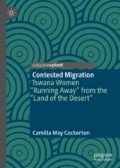Abstract
The issue of control over women’s mobility, a long concern within Tswana society, came increasingly to the forefront in colonial thinking during the course of the twentieth century. In part this was a response to the entreaties of the Tswana chiefs, an appeal constructed on the discursive terrain of the “immoral woman.” As the twentieth century progressed, Tswana men and colonial officials increasingly discussed and debated the control and confinement of black women. There were points of congruence and tension in the alliance. With the penetration and consolidation of British colonialism in Bechuanaland, the locus of control over women had begun to shift from dikgosi, male elders, and husbands towards the more impersonal colonial state. African patriarchs clearly lost not only political and military power because of colonial conquest, but also patriarchal power over dependent females.
Access this chapter
Tax calculation will be finalised at checkout
Purchases are for personal use only
Notes
- 1.
Botswana Collection (BC), University of Botswana, Minutes of the Bechuanaland Protectorate Native Advisory Council, 17–18 March 1924, 18.
- 2.
Botswana National Archives (BNA), Papers of Bechuanaland Protectorate Administration, Secretariat, Mafeking, 1901–1966 (S.) 387/5, A. D. Forsyth Thompson, Resident Commissioner, to Government Secretary, 5 December 1942.
- 3.
BNA, S. 609/3, Circular Memorandum #6930/1, Government Secretary, to all District Commissioners, 9 July 1937.
- 4.
Kote, “Recruitment of Mine Labour,” 2.
- 5.
Public Record Office, London (PRO), DO 9/6, X. Goodfriend, Priest in Charge and British Subject, Vleeschfontein, to Resident Magistrate, Zeerust, 15 February 1927.
- 6.
PRO, DO 9/6, D. R. Oberholzer, Sergeant, South African Police, Zeerust, to unknown, 18 February 1927.
- 7.
BNA, S. 481/9/1, Circular #634, Dominions Office, to the High Commissioner, 19 November 1937. A Resolution regarding women’s status was adopted by the Assembly of the League of Nations in September 1935.
- 8.
BNA, S. 100/2, Passfield, Downing Street, to the Earl of Athlone, the High Commissioner, 4 April 1930.
- 9.
BC, Minutes of the 13th session of the Bechuanaland Protectorate European Advisory Council, 1928, comment by Mr. Weatherilt, 44.
- 10.
BNA, S. 100/2, “Confidential” Medical Dept. Circular No. 33, H. W. Dyke, Principal Medical Officer, Mafeking, to All Medical Officers in the Bechuanaland Protectorate, 25 May 1930.
- 11.
BNA, S. 100/2, Malan, District Surgeon, Mochudi, to the Principal Medical Officer, Mafeking, 27 May 1930; ibid., Medical Officer, Selika, to the Principal Medical Officer, Mafeking, 30 May 1930; ibid., A. Huse, D. S., Kanye, Resident Magistrate, Kanye, 3 June 1930; ibid., Medical Officer, Francistown, to the Principal Medical Officer, 19 June 1930.
- 12.
PRO, DO 119/1268, Schapera, “Migrant Labour” (report), 26, quoting Dr. H. W. Dyke (Principal Medical Officer in 1931).
- 13.
BNA, Papers of Resident Magistrate/District Commissioner offices (DCS) 30/6, letter #S. 1408, W. F. Mackenzie, District Commissioner, Serowe, to the Government Secretary, Mafeking, 18 December 1946.
- 14.
BNA, Papers of Resident Commissioner, Mafikeng, 1895–1930 (RC) 2/48, “Conditions Affecting Native Labour in the Bechuanaland Protectorate,” Resident Commissioner, Mafeking, to the High Commissioner, Johannesburg, early March 1910.
- 15.
BNA, S. 481/9/1, Government Secretary, to [Dominions Office?], 23 December 1937.
- 16.
BC, Minutes of the Bechuanaland Protectorate Native Advisory Council, 17–18 March 1924, 18. Although Ellenberger did not mention a starting date, these measures were probably introduced in the early 1920s.
- 17.
PRO, DO 9/7, Speech (prepared) from Linchwe Pilane, to L. C. M. S. Amery, His Majesty’s Principal Secretary of State for Dominion Affairs and for the colonies, August 1927; PRO DO 9/13, The High Commissioner, 25 January 1929, citing material from an interview between the High Commissioner and the Chief Tshekedi, at the Government House, Cape Town, 21 January 1929.
- 18.
BC, Minutes of the Bechuanaland Protectorate Native Advisory Council, 17–18 March 1924, 10–11, 18.
- 19.
Eales, “Gender Politics,” 198.
- 20.
BC, Minutes of the 7th Meeting of the Bechuanaland Protectorate Native Advisory Council, 17 March 1927, 7.
- 21.
BC, Minutes of the 7th Meeting of the Bechuanaland Protectorate Native Advisory Council, 17 March 1927, 7–8.
- 22.
BNA, S. 100/2, Medical Officer, Serowe, to the Principal Medical Officer, Mafeking, 25 June 1930. This Medical Officer commended women’s “innate disposition” to hard labour.
- 23.
Molema, The Bantu Past and Present, 132.
- 24.
BNA, S. 92/6, Extract from Minutes of the 37th session of the Bechuanaland Protectorate European Advisory Council, 24–28 September 1945, comment by Mr. Glover, 56.
- 25.
BNA, RC 2/48, Resident Commissioner, to the High Commissioner, March 1910.
- 26.
Crowder, The Flogging of Phinehas McIntosh.
- 27.
BNA, S. 173/3, letter #246, High Commissioner, Cape Town, to Resident Commissioner, 27 February 1931.
- 28.
Bitsang, “Chiefs, the Transfer,” quoting High Commissioners Proclamations and Government Notices, Vol. XIX (1934), 88–95.
- 29.
Moeding College Library, Otse, Envelope 311, Rev. J. H. L. Burns, Miscellaneous Correspondence 1931–1932, “Notes on The Political Situation at Serowe, January 1931,” 3.
- 30.
BNA, S. 173/3, letter #246, High Commissioner, Cape Town, to Resident Commissioner, 27 February 1931.
- 31.
BNA, S. 173/6, “Confidential” letter, Nettelton, Resident Magistrate, Francistown, to the Government Secretary, Mafeking, 10 May 1931, 5.
- 32.
BNA, S. 173/3, “Confidential” letter, C. F. Rey, Resident Commissioner, to the High Commissioner, Cape Town, 31 January 1931.
- 33.
BL, PP 7617.ad, The High Commission Territories Law Reports published by The High Court, Maseru, Basutoland.
Author information
Authors and Affiliations
Rights and permissions
Copyright information
© 2019 The Author(s)
About this chapter
Cite this chapter
Cockerton, C.M. (2019). Policing the Boundaries: Intervention, Control, and the Colonial State. In: Contested Migration. Palgrave Pivot, Singapore. https://doi.org/10.1007/978-981-13-2589-2_6
Download citation
DOI: https://doi.org/10.1007/978-981-13-2589-2_6
Published:
Publisher Name: Palgrave Pivot, Singapore
Print ISBN: 978-981-13-2588-5
Online ISBN: 978-981-13-2589-2
eBook Packages: Social SciencesSocial Sciences (R0)

